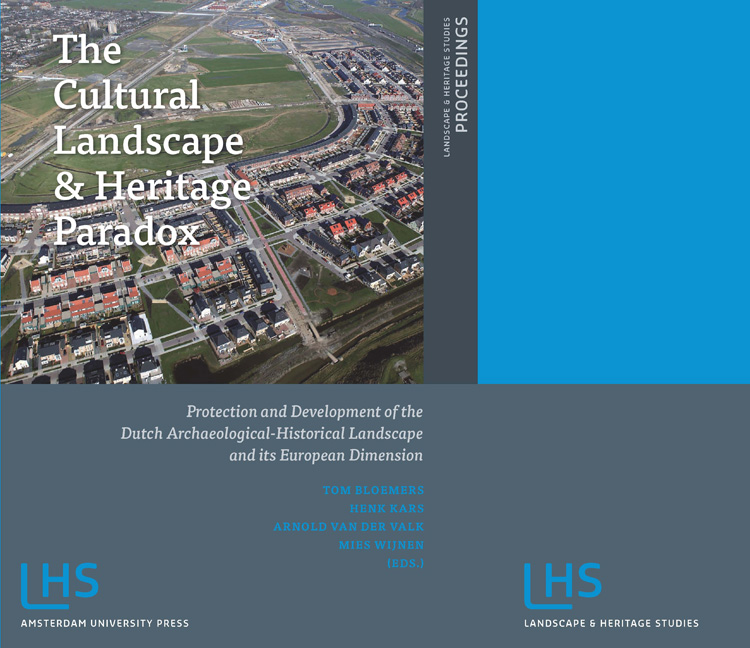 The Cultural Landscape and Heritage Paradox
The Cultural Landscape and Heritage Paradox Book contents
- Frontmatter
- Contents
- Preface
- I INTRODUCTION
- II INSIGHTS AND PROSPECTS OF ARCHAEOLOGICAL-HISTORICAL LANDSCAPE STUDIES
- III LINKING KNOWLEDGE AND ACTION
- IV IMAGINATION - FACTS AND CONSTRUCTIONS
- V SHARING KNOWLEDGE - STORIES, MAPS AND DESIGN
- VI SYNTHESIS AND CONCLUSIONS
- VII MANAGEMENT OF KNOWLEDGE
- VIII AGENDA FOR THE FUTURE
- IX SUMMARY
- X APPENDIX
- Subject Index
- Index of Places and Regions
What have we learnt?
Published online by Cambridge University Press: 21 January 2021
- Frontmatter
- Contents
- Preface
- I INTRODUCTION
- II INSIGHTS AND PROSPECTS OF ARCHAEOLOGICAL-HISTORICAL LANDSCAPE STUDIES
- III LINKING KNOWLEDGE AND ACTION
- IV IMAGINATION - FACTS AND CONSTRUCTIONS
- V SHARING KNOWLEDGE - STORIES, MAPS AND DESIGN
- VI SYNTHESIS AND CONCLUSIONS
- VII MANAGEMENT OF KNOWLEDGE
- VIII AGENDA FOR THE FUTURE
- IX SUMMARY
- X APPENDIX
- Subject Index
- Index of Places and Regions
Summary
ABSTRACT
The synthesis and conclusions follow the thematic structure of the previous sections based on the interaction between knowledge, policy, imagination and practice (see Ch. I, 13 and Fig. 7 and sections III-V). In the synthesis the conditions, focus and characteristics of the interaction and the components of knowledge creation will be considered, mainly based on the PDL/BBO results and experiences. The conclusions deal with the value for the various groups of users of the relevant knowledge acquired by the PDL/ BBO programme and combine this with the contributions from Europe to identify the factors influencing success and failures and to present the ‘lessons’.
In the synthesis (section 2) we take into consideration the actors and users that embody the knowledge supply-demand relationship within research and between research, policy and practice. Woven into the texture of the synthesis is the understanding of the knowledge creation process as defined by Weggeman. For its various components the key notions resulting from the PDL/BBO programme are presented in catchwords in Fig. 1-4. The most relevant acquired knowledge covers the interpretative heritage approach, the best practice for the application of the biography concept and action research, the potential abilities that are already available but have to be adapted and new ones that have to be developed, and the need for a community of practice.
In the concluding section 3 we will assess the value of the PDL/BBO programme for the various user groups. Together with the contributions from Europe the factors are identified that influence success and failures of integrative landscape heritage research and management and create opportunities and threats. Finally the ‘lessons learned’ are presented to cope with the cultural landscape and heritage paradox and the knowledge-action nexus. In the present phase of transition from site- towards landscapeoriented approach, the region is the proper scale and entity to link knowledge and action and to develop, test and apply the integrative action research methodology. Imagination can be fully exploited when it is framed in the duality of super- and infrastructure and democratic legitimation. This can create the conditions for co-operation resulting in a community of practice for cultural planning, but it should be supported by various forms of interpretative reflection. The well-balanced combination of thematic c.q. problem-oriented and regionally oriented studies has proven to be a fruitful balance of depth and breadth of approaches.
- Type
- Chapter
- Information
- The Cultural Landscape and Heritage ParadoxProtection and Development of the Dutch Archaeological-Historical Landscape and its European Dimension, pp. 503 - 518Publisher: Amsterdam University PressPrint publication year: 2010
- 1
- Cited by


